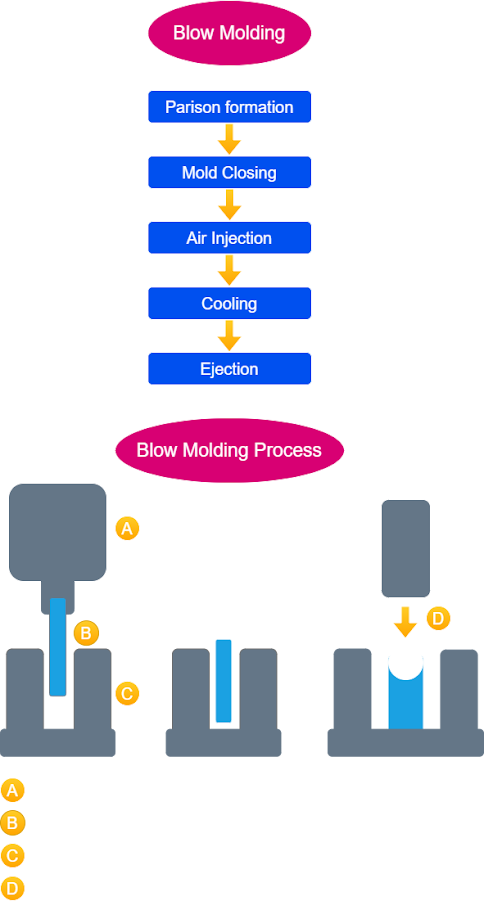Plastics : Blow Molding and Thermoforming processes Simply explained
Parison Formation:
- Tube extrusion
- Wall thickness
- Length control
Mold Closing:
- Parison capture
- Pinch-off
- Seal formation
Air Injection:
- Pressure control
- Expansion
- Shape forming
Cooling:
- Wall setting
- Temperature control
- Time management
Ejection:
Main role of blow molding:
- Creates hollow plastic items
- Makes containers and bottles
- Works like blowing up a balloon inside a mold
Best Used For:
Containers:
- Water bottles
- Soda bottles
- Shampoo bottles
- Milk jugs
- Chemical containers
Large Items:
- Fuel tanks
- Storage drums
- Industrial containers
- Large water tanks
Characteristics:
- Hollow inside
- Even wall thickness
- Strong construction
- Good for liquids
Process Benefits:
- Production:
- Fast production
- Consistent quality
- High volume possible
- Cost-effective
Design:
- Complex shapes possible
- Built-in handles
- Various sizes
- Good strength
Remark:
A parison is a hollow, tube-shaped piece of molten plastic that's extruded before blow molding.
Think of it like a hot plastic tube that will become a bottle or container.
Thermoforming process:
The below describes the elements in the above diagram:
Sheet Heating:
Sheet Heating:
- Temperature control
- Heat distribution
- Sag control
Sheet Formation:
- Mold contact
- Pre-stretch
- Material distribution
Vacuum/Pressure:
- Shape forming
- Detail reproduction
- Wall thickness
- Shape setting
- Temperature control
- Cycle time
Trimming:
- Edge removal
- Part separation
- Scrap handling
Main Role:
- Creates shaped plastic items from sheets
- Makes packaging and trays
- Works like vacuum-sealing plastic over a mold
Best Used For:
Packaging:
- Food containers
- Blister packs
- Electronics packaging
- Medical trays
- Product displays
Large Panels:
- Vehicle parts
- Refrigerator liners
- Shower units
- Signs
- Machine covers
Characteristics:
- One-sided detail
- Thin walls
- Large surface areas
- Uniform thickness
Process Benefits:
Production:
- Lower tooling costs
- Quick setup
- Large parts possible
- Good for small runs
Design:
- Fine detail possible
- Large surfaces
- Clear products
- Texture options
Quick Comparison:
Blow Molding:
- Makes : Hollow items
- Best for : Bottles and containers
- Strengths : Liquid containers
- Cost : Higher setup, lower per piece
Thermoforming:
- Makes : Shaped sheets
- Best for : Packaging and trays
- Strengths : Large, detailed surfaces
- Cost : Lower setup, higher per piece





Comments
Post a Comment